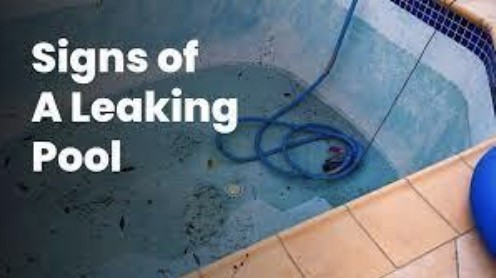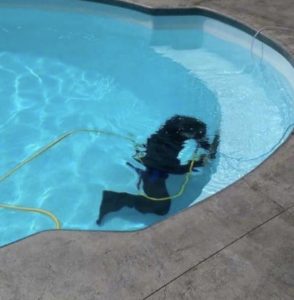Pool Leak Detection


Pool Leak Detection: How to Find & Fix Pool Leaks
A sparkling, crystal-clear pool is the epitome of relaxation, but what happens when that oasis starts losing water unexpectedly? Pool leaks pose a significant challenge for pool owners, leading to not only a reduction in water levels but also potential property damage. In this guide, we will delve into the unmistakable indicators of pool leaks, methods for detection, and straightforward steps to address these issues, ensuring the ongoing clarity and perfection of your pool.
Pool Leak Detection:
Here’s a clear disclaimer: If you suspect a leak and need professional assistance, consider googling leak detection near me and picking highly-rated professionals serving your local area since they are the ones most knowledgeable about commonly-found issues in the area and their fixes. For example, let’s say you’re from Vero Beach FL or Port St Lucie FL, it would be wise to contact professionals offering services like leak detection in Vero Beach or leak detection in Port st Lucie. These professionals have specialized equipment to pinpoint and address leaks accurately. Doing DIY might seem cheaper but can also end up causing a bigger mess, or worse, hurting you. With that disclaimer out of the way, let’s delve into signs of pool leaks and how to fix them.
Signs of a Pool Leak:
Before the detection process, it’s important to recognize the signs of a pool leak. Some common indicators include:
- Equipment Issues: Malfunctions or irregularities in the pool pump or filter system could be linked to a leak affecting the equipment’s efficiency.
- Unexplained Increase in Water Bills: A sudden, unexplained spike in your water bills, especially during the swimming season, may be a sign of a significant pool leak.
- Warm Spots in the Pool: Detecting warm areas in the pool water, particularly when the pool heater is off, might indicate a leak from a warm water source.
- Unexplained Water Loss: If you notice a significant drop in your pool’s water level that can’t be attributed to evaporation or splashing, a leak might be the culprit.
- Soggy Ground around the Pool: Wet or soft spots in the ground near your pool can indicate an underground leak.
- Cracks in the Pool Structure: Visible cracks in the pool walls or floor may signal a leak, especially if they’re not associated with settling or ground movement.
- Unusual Chemical Imbalance: Consistently struggling to maintain proper chemical levels could indicate water loss due to a leak.
- Continuous Need for Water Addition: If you find yourself frequently adding water to maintain the pool at the desired level, it could be a sign of an ongoing leak.
- Decreased Water Pressure: A noticeable reduction in water pressure from pool features such as jets, fountains, or waterfalls may indicate a leak in the plumbing.
- Algae Growth: Unexplained or persistent algae growth, despite regular maintenance and chemical balancing, might suggest a leak altering water chemistry.
- Visible Settling or Distortion: Uneven settling of the pool deck or distortion in the pool’s shape may be indicative of soil erosion caused by a leak.
Unpleasant Odors: A persistent musty or unpleasant odor around the pool area could be a result of stagnant water due to an undetected leak.

Detecting Pool Leaks
nce you’ve identified potential signs of a pool leak, the next step is to locate the exact source. Here are some effective methods to help you with pool leak detection:
1. Pressure Test:
- Shut off the pool pump.
- Using a plug, seal the skimmer or main drain.
- Attach a pressure tester to the pool return line.
- If the pressure drops, it suggests a leak in the plumbing.
2. Bucket Test:
- Fill a bucket with pool water to the same level as the pool.
- Place the bucket on the pool steps or ledge, ensuring it’s immersed in the water.
- Mark the water levels inside the bucket and on the pool.
- After 24 hours, compare the water loss inside the bucket to the pool’s loss. If the pool loses more water, there’s a leak.
3. DYE TEST:
- Turn off the pool’s filtration system.
- Add a few drops of food coloring near suspected leak areas.
- Observe if the dye gets drawn towards any particular spot, indicating the presence of a leak.

Fixing Pool Leaks
Once you’ve successfully identified the leak, it’s time to address the issue. Here are some DIY solutions and tips for fixing common pool leaks:
Epoxy Putty for Concrete Pools:
- Locate the crack and clean the area thoroughly.
- Mix and apply an underwater epoxy putty, following the manufacturer’s instructions.
- Smooth the putty to match the pool surface.
Pipe Sealants for Plumbing Leaks:
- Identify the leaking pipe or fitting.
- Turn off the pump, drain excess water, and dry the area.
- Apply a pool-safe pipe sealant or epoxy to the leaking area.
Vinyl Liner Patches:
- For small tears or holes in the vinyl liner, use a pool liner patch kit.
- Drain the pool water below the tear, clean the area, and apply the patch according to the kit instructions.
Professional Help:
If you’re unsure or the leak is beyond your DIY capabilities, consider hiring a professional pool leak detection and repair service. Professionals that have specialization in drain inspection and using sewer drain liners to execute pipe lining projects like trenchless sewer repairs are generally the ones that can easily and thoroughly tackle pool leak detection and fixes.
Preventing Future Leaks
While fixing leaks is essential, preventing them is equally crucial.Here are some tips to help you avoid future pool leaks:
Proper Winterization:
If you live in a region with cold winters, ensure proper winterization to prevent freeze-related damage, which can lead to leaks.
Regular Inspections:
Conduct routine inspections of your pool’s structure, equipment, and plumbing. Look for signs of wear, cracks, or loose fittings and address them promptly.
Careful Landscaping:
Be cautious when planting trees or shrubs near the pool area to avoid root damage to the pool structure or plumbing.
Chemical Balance:
Maintain proper chemical balance to prevent corrosion and deterioration of pool components.
Conclusion:
In conclusion, maintaining a pool’s integrity is essential for the sustained enjoyment and longevity of your aquatic oasis. Recognizing the diverse signs of a pool leak, as discussed earlier, equips you with the knowledge needed to promptly address any issues that may arise. Whether it’s unexplained water loss, visible cracks, or subtle hints like warm spots, early detection is key. By employing DIY detection methods like the bucket and dye tests or seeking professional assistance when needed, you can ensure a swift resolution to leaks. Moreover, the importance of preventive measures cannot be overstated. Regular inspections, proper winterization, careful landscaping choices, and maintaining a balanced chemical environment are all integral in safeguarding your pool against potential leaks.
Remember, by staying proactive in your pool maintenance efforts, you not only preserve the tranquility of your backyard retreat but also save yourself from the headaches and expenses associated with extensive pool repairs. So, embrace these guidelines, enjoy your pristine pool, and relish the serenity it brings to your outdoor space.
Remember, a little proactive maintenance goes a long way in preserving the serenity of your backyard oasis.
Contact Us Today!
Our Services

$50 OFF POTABLE WATER PIPE REPAIR
Schedule your service today

Enter Your Email to get a Coupon
The Pipe Surgeons Promise
You know that a company cares about the quality of their work when they stand behind it. We have some of the best South Florida sewer pipe repair and pipe installation warranties and guarantees in the industry because we know our staff and our products are the best in the business. Our passionate technicians are friendly, clean, polite, drug-free, and experienced while both our parts and products are state-of-the-art—guaranteed!